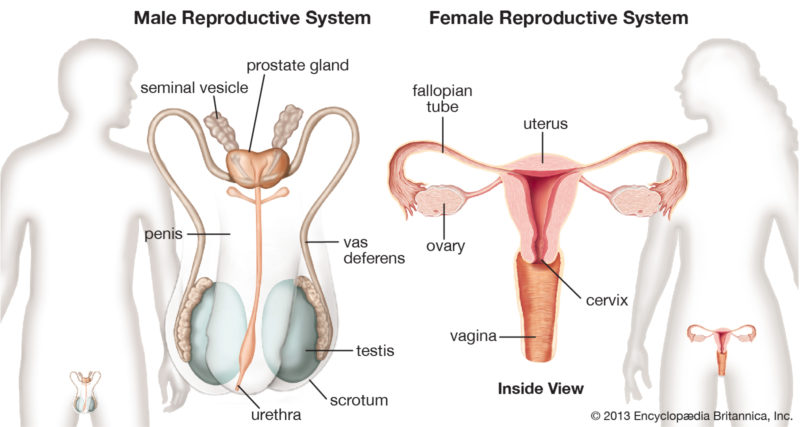What is the difference between the male and female reproductive systems?
Understanding the human reproductive system can be difficult for some students. The anatomy of the male and female reproductive system tend to be quite different. The female reproductive system function and structure of the male reproductive system tend to toss our minds a lot during revision.
The main difference between the female and male reproductive systems is that the male reproductive system produces and delivers sperms to the female reproductive system whereas the female reproductive system facilitates fertilization and develops the baby.
The lesson provides a comprehensive discussion dealing with the difference between a male and female reproductive system with a comparison chart to make the revision of the topic quite easy. Let’s find out:
Read More: Difference between Male and Female Urethra

What Is Male Reproductive System?
The male reproductive system refers to male genital organs that are responsible for the production of sperms. They are designed in a way that they can deliver the sperms into the female reproductive system.
Most parts of the male reproductive system occur outside the body. Some of the popular components of this reproductive system are the penis, scrotum, seminal vesicles, and prostate among many others.
The location of the sperm-producing part of the male reproductive system help to protect the damage the sperms by the internal body heat. The outside has a lower temperature that keeps the sperm healthy.
You May Also Enjoy: Difference between Menarche and Menopause
What Is Female Reproductive System?
The female reproductive system refers to the female genital organs which are designed for nurturing the baby. These structures can either be internal or external. Every part of the female reproductive system occurs inside the body.
The main components of the female genitals are the vulva, clitoris, vagina, cervix, ovaries, fallopian tube, and mammary glands among many others. These components play a different vital role in female genitals.
Comparison Chart: Male Vs Female Reproductive System
| Basic Terms | Male Reproductive System | Female Reproductive System |
| Meaning | Refers to male genitals responsible for reproduction | Refer to female genitals that deals with reproduction |
| Designed for | Delivery of sperms into the female genitals | Nurturing of the baby |
| Location | Occur outside the made | Every part occur inside the body |
| Structure | Comprise of penis, scrotum, seminal vesicles, vas deferens, prostate, and Cowper’s gland | Consists of the vulva, clitoris, perineum, vagina, cervix, uterus, Fallopian tubes, ovaries, and mammary gland |
| Gonads | Testes | Ovaries |
| Urethra Role | Passage of urine and semen | Urine only and occur separately from the vagina |
| Hormones | GnRH, LH, FSH, and testosterone | GnRH, LH, FSH, estrogen, and progesterone. |
| Hormone Production | Experience a continuous production of hormones | Experience a cyclic production of hormones |
| Function | Continuously produces gametes | The production of gametes stops with menopause |
| Number of Gametes | Males produce one billion sperms per month | The female produces a single ovum per month. |
Difference between Male and Female Reproductive System
- Common diseases affecting the male reproductive system are autoimmune disorders, infertility, cancer, and Peyronie’s disease while those in the female reproductive system are endometriosis, genetic abnormalities, cancer, autoimmune disorders, and infertility
- The main function of the male reproductive system is the production of sperms while that of the female reproductive system is nurturing of the baby
- The core hormones in the male reproductive system are androgens and testosterone while in the female reproductive system is estrogen and progesterone
- The male reproductive system is located outside the body while the female reproductive system inside the body
- The production of hormones in males is a continuous process while in the female it occurs in a cyclic process
- Male produces one billion sperms per month while females produce a single ovum per month
- The male gonads are testes while female are ovaries
- The structural components of the male reproductive system are penis, scrotum, prostate, and Cowper’s’ gland while those of the female reproductive system are vagina, vulva, uterus, cervix, and fallopian tube
- The male reproductive system is designed to deliver sperms while the female reproductive system to nurture the baby
Read More: Difference between White and Clear Sperm
Similarities between the Male and Female Reproductive System
- Both are responsible for the production of gametes
- Both are located around the pelvic region
- Both are affected by reproductive diseases such as cancer and infertility
- Both secrete specific hormones
- Both experience meiosis
- Both are vital for sexual reproduction
Comparison Video
https://youtu.be/cdfHY69Th0M
Summary
The core difference between male and female reproduction system is that male reproduction system comprises of a collection of male organs which deal with production and delivery of sperms into the female while female reproduction of system comprises of both external and internal structures of the female which facilitate reproduction
More Sources and References
- https://www.britannica.com/science/human-reproductive-system
- https://socratic.org/questions/differences-between-male-and-female-reproductive-system
- https://www.ncbi.nlm.nih.gov/pmc/articles/PMC5557854/